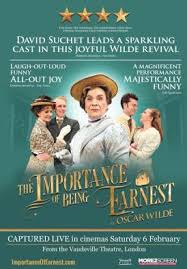
THE IMPORTANCE OF BEING EARNEST
UK, 2015, 150 minutes, Colour.
David Suchet, Emily Barber, Michael Benz, Philip Cumbus, Imogen Doel, Michele Dotrice, David Killik, Richard O' Callaghan.
Directed by Adrian Noble.
This Oscar Wilde play has taken its place of one as one of the most popular in English literature and theatre. First performed in1895, it has been continually performed, many actresses taking on the role of Lady Bracknell including Patricia Routledge and Maggie Smith, and in film versions, Dame Edith Evans setting the tone in the 1952 version by Anthony Asquith, followed by Judi Dench in Ol Parker’s less than admirable version, omitting key lines…).
The novelty in this production, the play filmed at the Vaudeville Theatre in London, is that the role of Lady Bracknell is taken by celebrated actor, David Suchet (following the footsteps of such actors as Geoffrey Rush who performed this role in Australia).
The important thing is Oscar Wilde, his wit, his way with words, his style (over sincerity, as the text of the play suggests), the farcical coincidence.
The title is important, the two characters using the name Ernest, for flirting, for proposals, the comedy about christening.
The film opens with Jack and Algy, 19th century men about town, full of style, rather vapid conversation, with some wealth, generally inherited, uttering all kinds of paradoxes about life and truth, Algy inventing the character, Bunbury, who is perpetually sick and therefore has to be visited in the country while Jack has invented his troublesome younger brother, Ernest, in London, whom he has to visit and try to improve. In these sequences, the butler, Lane, has some very effective sardonic lines.
The focus of the film and the play then centre on Lady Bracknell, a fairly formidable harridan, full of pomp and circumstance, a woman of society yet critical of it, a parody of wealthy English women in London Society of the period. Her daughter is in Gwendoline who has fallen in love with Jack, thinking he is Ernest. In many ways, she takes after her mother. Jack proposes and Lady Bracknell interrogates him about his origins – leading to the film’s discussions about the handbag in the cloakroom at Victoria Station. David Suchet does some different business with the utterance, ‘Handbag!!’, beginning to titter in humour at this thought. Rashly, Jack gives the address of his country estate where his ward, Cicely, lives, and Algy takes advantage of it.
The second act is in the country, introducing Cicely, 18 years old, disliking studies, working with Miss Prism, imagining her uncle’s worthless brother, Ernest, keeping the diary, for her secrets, and creating an engagement. She is a wilful, sometimes silly young girl. When Gwendoline arrives, they are friends, but then, thinking that each is engaged the same person, they become enemies. Jack arrives, in mourning, with the news of the death of his brother – who has already turned up in the form of Algy. This brings the two women together, the criticisms of the men, asking for explanations and excuses – and easily satisfied because they are in love.
Michele Dotrice is in the vein of Margaret Rutherford as Miss Prism, infatuated with Canon Chasuble, Richard O’Callaghan?, who has some amusing lines about his sermons for any occasion, and his being in favour of christening with his sermon against the Anabaptists. Miss Prism is quite giddy in his presence.
The denouement of the whole charade comes with the presence of Lady Bracknell, her snobbish attitude towards Cicely, hearing how wealthy she is and changing her tone, and then the humour with Miss Prism returning the whole revelation about the baby, the manuscript of the three volume sentimental novel, and the handbag in Victoria Station.
And Jack, looking up information about his military father discovers, of course, that his real name is Ernest Jack.
For those who are not familiar with the play, there is the delight of hearing the language, the witticisms, the satire, and the spoof of British society. With those who know the play well, there are the comparisons with previous versions, especially Dame Edith Evans, whom David Suchet seems to be channelling in a loud and demanding performance, and her dominating performance in the 1952 film, the archetypal Lady Bracknell.